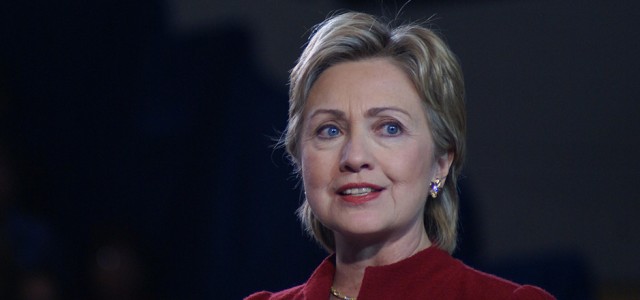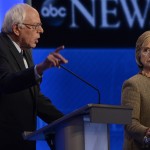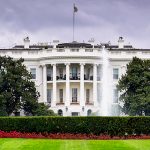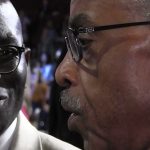I spoke with Democratic Presidential frontrunner Hillary Clinton in a one-on-one interview on my radio show on Philadelphia’s 900 AM WURD.
Click here for the full audio.
Click here to read the Philadelphia Daily News column based on the interview.
Click here to read listen to the WHYY story.
Read on for a full transcript of the interview.
I believe that we have to build on the progress that President Obama has made and I want to go further as I have been throughout this campaign speaking out against systemic racism and calling on white people to recognize the injustices that too many of our fellow Americans– predominately African Americans, also Latinos, live with.
SJ: There’s been much talk of the black community making demands in exchange for our votes. The Black Lives Matter movement has shown that the black community as a collective is demanding equal treatment under the law. What makes you the best candidate to meet that demand?
HC: I think that this is an absolutely appropriate and necessary demand and it is one that unfortunately we have yet to fulfill there has to be a renew emphasis on dealing with systemic racism in all aspects of our society. Not just the criminal justice system although that’s where it is often most painfully and obviously seen, but in jobs, in education, in healthcare. And I believe that we have to build on the progress that President Obama has made and I want to go further as I have been throughout this campaign speaking out against systemic racism and calling on white people to recognize the injustices that too many of our fellow Americans– predominately African Americans, also Latinos, live with. And I don’t know that we will make progress unless we really break through what I think has been a kind of either resistance or denial that these problems continue.
Too many people think, “Well, we’ve had the Civil Rights Movement, well we’ve had our first black president, that’s behind us.”
And in fact as we know all too well, it’s anything but behind us. And we have an opportunity, which I intend to drive as hard as I know how, both with words, but more importantly in my opinion with actions, at all levels, not just in the government but in communities, in every institution in our society, to confront these truths.”
SJ: Both you and your husband have faced Black Lives Matter protesters at events. In some cases it went well. In others it didn’t. What have you learned about the issues blacks face in the criminal justice system after being directly confronted by those protesters?
HC: I respect these predominately young people who have turned this movement into a real vehicle for not just expressing the problems but raising them to such a high visibility. And so I’ve learned quite a bit meeting with them, listening to them and I hope that as we move forward I can be part of the solution. When we are protested against I think—as my husband pointed out in Philadelphia—we need to listen to each other. And it’s not enough just to express your frustration or even your anger at what is wrong. You know, we need to figure out how we’re going to make progress in dealing with those problems. And much of the protesting has been focused on the 1994 crime bill, and as my husband has said repeatedly last summer before the NAACP, there were positive steps take in that bill and in that package of bills to deal with the problems that literally people across the country were concerned about.
I don’t think we come to the right solutions if we act as if nothing positive came out of our efforts … So I’m someone who comes at these problems in a maybe too practical, maybe too pragmatic a way. I will admit that. I’m trying to say, look, let’s figure out what worked. Let’s figure out what didn’t work. Let’s move as expeditiously as possible to fix what did not work.
The crime epidemic, the open-air drug and crack fairs and houses were just destroying neighborhoods, families, creating horrible situations. So yes, we did have to address that. And I think it’s absolutely fair to say that it did not eliminate, in fact it, in some ways opened the door to more systemic racism. It encouraged states to go way too far in how they were dealing with not only sentencing, but building prisons, creating private prisons, etc. So yes, we do have to address it, but I don’t think we come to the right solutions if we act as if nothing positive came out of our efforts to try to end violence against women, to try to put more police on the streets, to try to deal with the lack of opportunities in communities for young people. So I’m someone who comes at these problems in a maybe too practical, maybe too pragmatic a way. I will admit that. I’m trying to say, look, let’s figure out what worked. Let’s figure out what didn’t work. Let’s move as expeditiously as possible to fix what did not work. But in order to do that, let’s have a conversation and bring the facts to the table so that we can all make progress as opposed to just talking past each other.
SJ: Yeah, but as first lady, you were publicly supportive of your husband’s policies, including the 1994 crime bill. You’ve expressed regret for the circumstances of that bill, but do you feel that you should be held personally responsible for the bill itself?
HC: No I don’t. honestly. You know, I do not. I did support the efforts that the bill undertook. My opponent, Sen. Sanders voted for it, and as late as 2006, was still touting his tough-on-crime credentials. My husband signed the bill. and I think what we have learned is that there were provisions that did not work and made things worse. It took too many people away from their families and out of their communities for too long. That’s why the very first policy speech I gave in this campaign was on criminal justice reform and ending the era of mass incarceration. I put forward a comprehensive plan that addresses these issues and talked about what we need to do to invest in jobs health care, education. I’m visiting programs like the one I visited in Philadelphia last week—Impact Services—that are trying to fill the gap that has been created. How do we divert more young people from the criminal justice system in the first place? Which means they need mentoring, they need skills training, they need job preparation, they need supports. And then how do we eliminate a lot of the low-level, non-violent offenses that led people to prison in the first place? How do we point out and end the systemic racism that sends young African American men to prison for doing the same things that young white men do and don’t end up in prison? And then how do we have more second chance programs? So I have a very deep personal commitment. I’ve spent most of my career, starting with the Children’s Defense Fund, trying to even the odds for people, trying to give more people a chance to live up to their own God-given potential. That’s what motivates me. That’s the mission I will have as president.
SJ: 2015 was the first year that children of color were the majority in America’s public schools. And in urban districts across the country, we suddenly see a defunding of public education, lack of teachers and supplies, closing of public schools. What federal policies would you implement to save public education in our cities?
Originally back in the 1960s the idea behind federal aid for education was to try to level that playing field, to try to use federal funding to support poorly funded public schools that were primarily serving low income kids—communities of color. You know in those days the urban-rural divide was part broad. Now unfortunately we have the inequities in cities, suburbs and rural areas. So I want more federal aid to be focused on the communities that need it most.
HC: That’s one of my biggest concerns and I’m gonna do several things. First I’m well aware of what’s happening at the local and state level. I find the total defunding and disregard of the needs of the children of Philadelphia outrageous. And I really have a lot of sympathy both for your mayor and your governor who are trying against implacable hostility from Republicans in the state legislature to remedy this inequity. So here’s what the federal government can do. Originally back in the 1960s the idea behind federal aid for education was to try to level that playing field, to try to use federal funding to support poorly funded public schools that were primarily serving low income kids—communities of color. You know in those days the urban-rural divide was part broad. Now unfortunately we have the inequities in cities, suburbs and rural areas. So I want more federal aid to be focused on the communities that need it most. You know, a lot of excellent public schools in our country that are funded by property taxes do not need that help and I want to concentrate it where it’s needed most.
Secondly, when I was with the Childrens Defense Fund I gathered some of the evidence that as used to open up our schools to kids with disabilities. We now have many, many children with all kinds of disabilities, not just the physical—whether its’ hearing sight, paralysis, whatever it might be—but we have so many children who are being held back because of learning lags developmental disabilities. And we promised when we passed that law back in the 1970s that the federal government would pay 40 percent of the cost of special education, because if you really break down the budgets in a lot of poor school districts, a lot of their budget is really under pressure because we all want to have children with disabilities get the best possible education, but they don’t have the funding to do everything they’re called to do, so the federal government should fulfill its promise. It’s only paid 17 percent. We need to get it to 40 percent. That would increase the budget for a lot of schools that are under incredible financial pressure. And then of course I want to do more to incentivize getting the best teachers into the schools that need them the most. We need to be supporting with subsidies and grants teachers to go into those schools. We need to be really closing the curriculum gap, because a lot of our schools no longer offer music, sports, art—the kinds of things that light up a kid’s face. So I have a very robust agenda to try to help lift up those schools that are being often penalized by state governments right now.
Photo: Hillary Clinton in Hampton, NH, by Marc Nozell / Flickr Creative Commons

Solomon Jones is an Essence bestselling author and award-winning columnist. He is the creator and editor of Solomonjones.com and morning host on 900 am WURD radio. Click here to learn more about Solomon.








